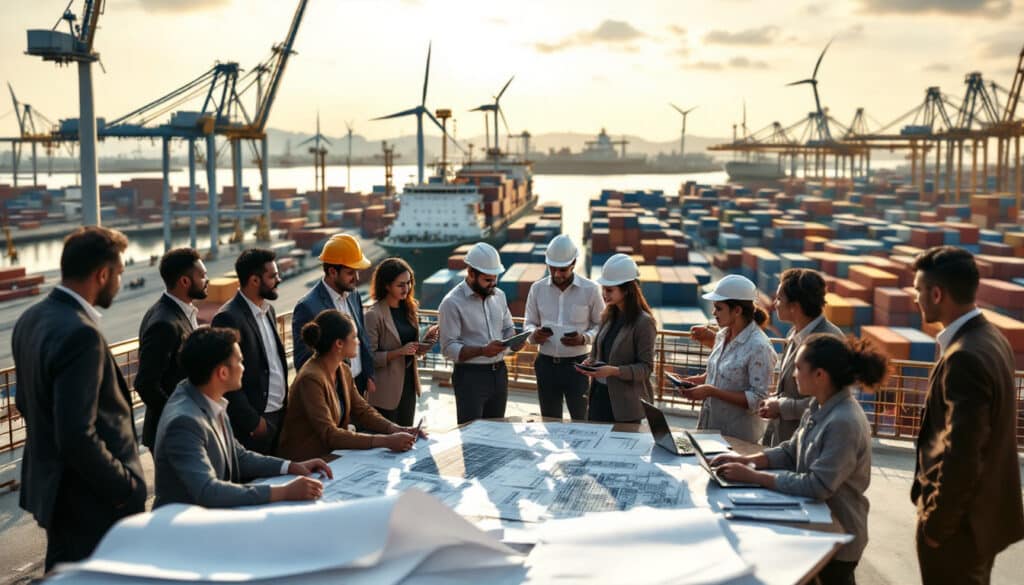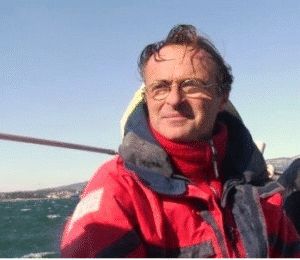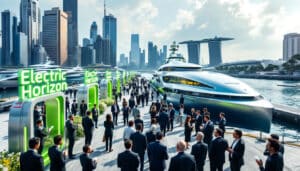Cookies and data are essential for the delivery and maintenance of Google services.
They allow for monitoring outages and protecting against spam, fraud, and abuse.
By measuring public engagement and site statistics, we better understand the usage of our services and improve their quality.
If you choose to “Accept All,” we will also use cookies and data to develop and improve new services, measure ad effectiveness, and display personalized content based on your settings. Non-personalized content is influenced by the content you are currently viewing, your activity in your active search session, and your location. Non-personalized ads depend on the content you are viewing and your general location. To manage your privacy settings, select “More options” or visit g.co/privacytools at any time.

Table of Contents
ToggleWhat are the challenges of decarbonizing the maritime sector in Indonesia?
The maritime sector in Indonesia plays a crucial role in the national economy, significantly contributing to international trade and the connectivity of the country’s many islands. However, this importance comes with major environmental challenges, including greenhouse gas emissions and marine pollution. Decarbonizing this sector is essential to reduce the country’s overall carbon footprint and meet international climate commitments.
Indonesia, as a gigantic archipelago, relies heavily on maritime transport for the movement of goods and people. This dependency leads to a continuous increase in CO2 emissions, affecting not only the local environment but also public health. Additionally, marine pollution from hydrocarbons and plastic waste threatens the diverse marine ecosystems of the archipelago.
Moreover, the Indonesian maritime sector faces logistical and infrastructural challenges in adopting cleaner technologies. The lack of adequate financial incentives and awareness of the benefits of decarbonization is slowing the transition to more sustainable practices. Consequently, it becomes imperative to find innovative and viable solutions to transform this vital sector while minimizing its environmental impact.
The decarbonization of the maritime sector in Indonesia is also linked to energy security. By reducing dependence on fossil fuels, the country can strengthen its energy autonomy and reduce its vulnerability to fluctuations in global oil prices. This paves the way for a more resilient and sustainable maritime economy, aligned with the UN’s sustainable development goals.
Finally, the preservation of marine natural resources is essential for tourism, another important source of income for Indonesia. Cleaner waters and healthy marine ecosystems attract more visitors, thereby contributing to economic growth while protecting the environment.
How do HDF Energy and its partners contribute to this initiative?
HDF Energy has partnered with several key players in the maritime and energy sectors to successfully decarbonize maritime activities in Indonesia. These strategic partnerships allow for the combination of technological expertise, financial resources, and local knowledge to develop innovative and effective solutions.
Through collaborations with local and international companies, HDF Energy can deploy cutting-edge technologies such as alternative fuels and electric propulsion systems. These initiatives aim to significantly reduce greenhouse gas emissions from ships and improve the overall energy efficiency of the maritime sector.
Furthermore, HDF Energy works closely with Indonesian authorities to establish regulations favorable to maritime energy transition. This includes creating tax incentives for companies adopting clean technologies and implementing strict environmental standards for ships operating in Indonesian waters.
HDF Energy’s partners also include non-governmental organizations and research institutes that provide essential data and analyses to monitor progress in decarbonization. This collaborative approach ensures transparency and efficiency of the undertaken projects, while fostering continuous innovation in the sector.
Additionally, HDF Energy is committed to training and raising awareness among maritime sector professionals about sustainable practices. Training programs are established to educate crews and ship managers on the importance of decarbonization and the best methods to achieve this goal. This contributes to creating a culture of environmental responsibility within the Indonesian maritime industry.
What innovative technologies are being used in this decarbonization project?
The decarbonization project led by HDF Energy in Indonesia integrates several innovative technologies aimed at reducing emissions and improving the energy efficiency of the maritime sector. Among these technologies, alternative fuels play a central role. The use of biofuels, green hydrogen, and methanol offers less polluting alternatives to traditional fossil fuels.
Electric propulsion systems are also at the heart of this transformation. By replacing diesel engines with electric motors powered by advanced batteries or fuel cells, ships can operate more quietly and energy-efficiently. These systems also allow for a significant reduction in NOx emissions and fine particles, thus improving air quality in ports and coastal areas.
Moreover, carbon capture and storage (CCS) technologies are being explored to capture CO2 emissions directly onboard ships. These systems enable the conversion of carbon into usable products or secure storage, thereby reducing the environmental impact of maritime operations.
Route optimization and the use of artificial intelligence (AI) also contribute to the energy efficiency of ships. By analyzing real-time data on weather conditions, maritime traffic, and fuel consumption, AI systems can recommend optimized routes to minimize energy consumption and emissions.
Finally, integrating renewable energies onboard, such as solar panels and wind turbines, allows for generating clean energy directly on ships. This approach reduces dependence on external energy sources and reinforces the energy resilience of ships against fluctuations in fuel prices.
What are the expected benefits for the environment and the Indonesian economy?
The decarbonization of the maritime sector in Indonesia promises numerous benefits for both the environment and the country’s economy. Environmentally, a significant reduction in greenhouse gas emissions contributes to mitigating climate change and protecting fragile marine ecosystems. Less air pollution improves air quality and reduces the risks of respiratory problems for local populations.
The preservation of marine ecosystems is also a major benefit, fostering biodiversity and the health of coral reefs, which are essential for tourism and fishing. Cleaner oceans attract more marine life, thereby enhancing the resilience of ecosystems against extreme weather events and destructive human activities.
Economically, the transition to clean technologies stimulates innovation and creates new opportunities in the renewable energy and environmental management sectors. This can attract foreign investments and strengthen Indonesia’s position as a regional leader in maritime sustainability.
Moreover, reducing energy costs through the efficient use of alternative fuels and renewable energies contributes to the competitiveness of Indonesian maritime businesses. Cleaner and more efficient ships can operate at lower costs, thereby increasing their profitability and attractiveness in international markets.
Finally, the creation of jobs in research, technological development, and the maintenance of new energy infrastructures fosters local economic growth. Decarbonization initiatives generate skilled jobs, thereby enhancing the skills of the Indonesian workforce and stimulating the socio-economic development of coastal communities.
What are the next steps for this partnership?
The partnership between HDF Energy and its collaborators for the decarbonization of the Indonesian maritime sector is at a crucial stage in its development. The next phases of the project involve the pilot implementation of the developed technologies, followed by a rigorous evaluation of their effectiveness and environmental impact.
One of the first steps is to deploy test ships equipped with the new propulsion technologies and carbon capture systems. These ships will serve as models to demonstrate the feasibility and benefits of the proposed solutions, while providing valuable data to optimize the systems before broader adoption.
Concurrently, HDF Energy and its partners plan to strengthen collaboration with academic institutions and local research centers. This initiative aims to foster continuous innovation and develop solutions tailored to the specificities of the Indonesian context. Collaborative research programs will be established to explore new technologies and improve existing ones.
Strengthening local capacities is also a priority. Training and professional development programs will be launched to prepare maritime sector workers for the new technological and environmental requirements. This includes training on the use and maintenance of electric propulsion systems, alternative fuels, and CCS technologies.
Furthermore, there are plans to work closely with local governments to develop policies and regulatory frameworks conducive to decarbonization. This includes implementing tax incentives, grants for clean technologies, and strict environmental standards for maritime operators.
Finally, HDF Energy plans to launch a large-scale awareness campaign to inform stakeholders, including maritime companies, local governments, and the general public, about the importance of decarbonization and the benefits of energy transition. This campaign aims to create widespread support and encourage the adoption of sustainable practices throughout the entire Indonesian maritime sector.









